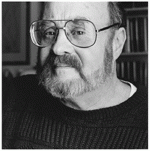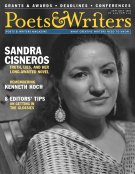Black Sparrow Press, based in Santa Rosa, California, began in 1966 as a vehicle for John Martin to publish the work that he loved—its inaugural offering was Terror Street and Agony Way, a book of poems by Charles Bukowski—but went on to become a financial success. It published more than 650 titles, with annual sales eventually rising to more than $1 million, which is why it came as a surprise to many in the publishing industry when Black Sparrow went out of business last spring.

Ecco Press, an imprint of HarperCollins, announced in May that it had bought the rights to 49 titles by Bukowski, Paul Bowles, and John Fante (plus five yet-to-be-published volumes by Bukowski). Neither press disclosed the amount of money exchanged, but it was enough to allow Martin to all but give away the rights to 184 of the remaining Black Sparrow titles in print to David R. Godine Publishers in Boston. Gingko Press in Corte Madera, California, acquired the rights to titles by Wyndham Lewis.
In late 2001 Martin became intensely aware of the weakened economy and its effects on publishing. When Daniel Halpern, Ecco's editorial director, approached him in early 2002 about purchasing rights to titles by three of the best-selling authors on the Black Sparrow backlist, Martin wasn't ready to sell. Black Sparrow sales had remained strong, but Martin feared he might not receive such an offer again. "In a way, I'm sorry," he says. "I've been doing this single-mindedly, with all the focus possible, for thirty-six years. But I'm seventy-one. And I thought, 'Well, why not?'" Besides, Halpern was persuasive. "They didn't want to buy the press, but they wanted to pay as if they were buying the press," Martin says.
Halpern had good reason to make the offer. Ecco already owned the rights to 10 titles by Bowles, and it now holds the rights to the complete works of both Bowles and Fante, as well as to most of Bukowski's works in print. Furthermore, Halpern views the purchase as a chance to link East Coast publishers and West Coast book buyers. "The L.A. book market may be the most interesting untapped book market in the country," Halpern says. Ecco intends to start tapping that market by hosting a "celebration" of Bukowski and Fante, both Los Angeles–based writers, as well as of Black Sparrow and the legacy of John Martin, in that city in early 2003.
After the sale to Ecco, Martin contacted David Godine about taking over the remaining titles. "This wasn't an acquisition; this was a gift," Godine says. "It was an act of unspeakable generosity." Although Godine says "some costs were involved," Martin essentially gave his remaining stock—about 85,000 books—to Godine, a publisher whose reputation he trusted, in an effort to protect his authors. Godine will maintain a separate Black Sparrow imprint and hire an independent editor to handle its list; he'll also honor any existing contracts Martin had with his authors, issuing any works-in-progress he'd agreed to publish.
"John gave away the inventory so we could get future royalties," says poet Diane Wakoski, who began publishing with Martin in the late 1960s and who has six books still in print with Black Sparrow.
Martin's loyalty to his authors is legendary. "I was publishing literature," he says of his initial strategy, "so its eventual sale or public acceptance didn't enter into it at all." Indeed, Black Sparrow's reputation as an advocate of avant-garde literature became well established over the years, as did its status as a proponent of what Wakoski calls "the old world of books that you handle because they're beautiful." Black Sparrow titles were printed on heavy, acid-free paper and featured award-winning covers designed by Martin's wife, Barbara.
Now Wakoski, Halpern, Godine, and many others are lauding Martin as a one-of-a-kind publisher—one whose editorial motives remained unchanged throughout three and a half decades in business.
"He's one of the great iconoclastic and individualistic acts in American publishing," Godine says. "He was looking for voices and he found them. You could rip the cover off, rip the title page, read five or six pages, and you'd know who wrote that book. He's going out in glory, as far as I'm concerned."
Joy Jacobson is a poet and editor who lives in Brooklyn.








